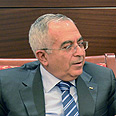
Dozens of sites in the West Bank are part of the new trend of construction, as the authorities refuse to wait for the revival of peace talks and are laying down the foundations and infrastructure for an independent state.
Related stories:
- Increasing rights violations in Gaza, West Bank
- Fayyad: Palestinian story is one of failed leadership
- Fayyad resignation bad for us
Yedioth Ahronoth obtained a document detailing the planned construction projects that are part of the "Fayyad Plan," a template for a de facto Palestinian statehood.
The majority of the projects are in the Israel-controlled Area C, and many of them have already begun. Some are awaiting the approval of the Civil Administration, the Israeli governing body that operates in the West Bank.
The Palestinians hope to push the projects that the Civil Administration will reject through negotiations as "confidence-building steps." In view of US Secretary of State John Kerry's frequent visits to the region, the plan looks grounded in reality.
The petitions submitted to the Civil Administration reveal the Palestinians intend to erect five cities, and a tourist town on the shores of the Dead Sea called Moonlight. The two airports will be built in East Jerusalem and the Jordan Valley. Plans are also in place to better harness the natural water and energy resources and water purification facilities.
The partition of the West Bank as stipulated in the Oslo Accords is as follows: Area A represents 11% of the West Bank, a geographically non-contiguous area subject to continual Israeli incursions which render it an area of a very limited autonomy. An approximate 28% of the West Bank is subject to Israeli military control and Palestinian civil control is designated as Area B; while Area C is an approximate 61% of the territory and is under full Israeli control.
In August of 2009, then-Palestinian Prime Minister Salam Fayyad issued a document titled "The end of the occupation and the creation of a state," saying a Palestinian state will arise over the West Bank up to the borders of 1967, east Jerusalem included. Since then Fayyad is working to blur the distinctions between the three areas.
Some of the projects in the plan are bankrolled by foreign governments, most notably Germany.
The Yesha Council said in a statement the plan represents a peril to Israel's security, a violation of obligations given to Israel, and runs afoul of international law.
Akiva Novick is a Yedioth Ahronoth reporter
- Receive Ynetnews updates
directly to your desktop















